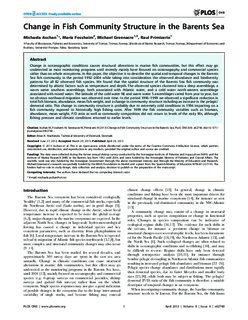| dc.contributor.author | Aschan, Michaela | |
| dc.contributor.author | Fossheim, Maria | |
| dc.contributor.author | Greenacre, Michael | |
| dc.contributor.author | Primicerio, Raul | |
| dc.date.accessioned | 2013-08-12T12:41:19Z | |
| dc.date.available | 2013-08-12T12:41:19Z | |
| dc.date.issued | 2013-04-29 | |
| dc.identifier.citation | schan M, Fossheim M, Greenacre M, Primicerio R (2013) Change in Fish Community Structure in the Barents Sea. PLoS ONE 8(4): e62748. doi:10.1371/journal.pone.0062748 | no_NO |
| dc.identifier.issn | 1932-6203 | |
| dc.identifier.uri | http://hdl.handle.net/11250/109196 | |
| dc.description.abstract | Change in oceanographic conditions causes structural alterations in marine fish communities, but this effect may go undetected as most monitoring programs until recently mainly have focused on oceanography and commercial species rather than on whole ecosystems. In this paper, the objective is to describe the spatial and temporal changes in the Barents Sea fish community in the period 1992–2004 while taking into consideration the observed abundance and biodiversity patterns for all 82 observed fish species. We found that the spatial structure of the Barents Sea fish community was determined by abiotic factors such as temperature and depth. The observed species clustered into a deep assemblage, a warm water southern assemblage, both associated with Atlantic water, and a cold water north-eastern assemblage associated with mixed water. The latitude of the cold water NE and warm water S assemblages varied from year to year, but no obvious northward migration was observed over time. In the period 1996–1999 we observed a significant reduction in total fish biomass, abundance, mean fish weight, and a change in community structure including an increase in the pelagic/demersal ratio. This change in community structure is probably due to extremely cold conditions in 1996 impacting on a fish community exposed to historically high fishing rates. After 1999 the fish community variables such as biomass, abundance, mean weight, P/D ratio as well as community composition did not return to levels of the early 90s, although fishing pressure and climatic conditions returned to earlier levels. | no_NO |
| dc.language.iso | eng | no_NO |
| dc.publisher | Public Library of Science | no_NO |
| dc.title | Change in Fish Community Structure in the Barents Sea | no_NO |
| dc.type | Journal article | no_NO |
| dc.type | Peer reviewed | no_NO |
| dc.subject.nsi | VDP::Agriculture and fishery disciplines: 900::Fisheries science: 920::Resource biology: 921 | no_NO |
| dc.source.pagenumber | 12 p. | no_NO |
| dc.source.volume | 8 | no_NO |
| dc.source.journal | PLoS ONE | no_NO |
| dc.source.issue | 4 | no_NO |
| dc.identifier.doi | 10.1371/journal.pone.0062748 | |
